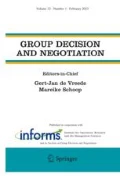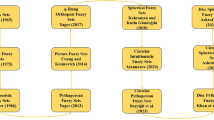Abstract
Individual consistency and group consensus are both important when seeking reliable and satisfying solutions for group decision making (GDM) problems using additive preference relations (APRs). In this paper, two new algorithms are proposed to facilitate the consensus reaching process, the first of which is used to improve the individual consistency level, and the second of which is designed to assist the group to achieve a predefined consensus level. Unlike previous GDM studies for consistency and consensus building, the proposed algorithms are essentially heuristic, modify only some of the elements in APRs to reduce the number of preference modifications in the consistency and consensus process, and have modified preferences that belong to the original evaluation scale to make the generated suggestions easier to understand. In particular, the consensus algorithm ensures that the individual consistency level is still acceptable when the predefined consensus level is achieved. Finally, classical examples and simulations are given to demonstrate the effectiveness of the proposed approaches.






Similar content being viewed by others
References
Alonso S, Chiclana F, Herrera F, Herrera-Viedma E, Alcalá-Fdez J, Porcel C (2008) A consistency-based procedure to estimate missing pairwise preference values. Int J Intell Syst 23:155–175
Cabrerizo FJ, Morente-Molinera JA, Pedrycz W, Taghavi A, Herrera-Viedma E (2018) Granulating linguistic information in decision making under consensus and consistency. Expert Syst Appl 99:83–92
Cao D, Leung LC, Law JS (2008) Modifying inconsistent comparison matrix in analytic hierarchy process: a heuristic approach. Decis Support Syst 44(4):944–953
Cavallo B, D’Apuzzo L (2009) A general unified framework for pairwise comparison matrices in multicriterial methods. Int J Intell Syst 24:377–398
Chiclana F, Herrera F, Herrera-Viedma E (1998) Integrating three representation models in fuzzy multipurpose decision making based on fuzzy preference relations. Fuzzy Sets Syst 97:33–48
Chiclana F, Mata F, Martinez L, Herrera-viedma E, Alonso S (2008) Integration of a consistency control module within a consensus model. Int J Uncertain Fuzziness Knowl Based Syst 16:35–53
Chu JF, Liu XW, Wang YM, Chin KS (2016) A group decision making model considering both the additive consistency and group consensus of intuitionistic fuzzy preference relations. Comput Ind Eng 101:227–242
Contreras I (2010) A distance-based consensus model with flexible choice of rank-position weights. Group Decis Negot 19(5):441–456
Dong YC, Xu JP (2016) Consensus building in group decision making: searching the consensus path with minimum adjustments. Springer, New York
Dong YC, Zhang HJ, Herrera-Viedma E (2016) Integrating experts’ weights generated dynamically into the consensus reaching process and its applications in managing non-cooperative behaviors. Decis Support Syst 84:1–15
Dong QX, Zhou X, Martínez L (2019) A hybrid group decision making framework for achieving agreed solutions based on stable opinions. Inf Sci 490(2019):227–243
Gong ZW, Xu C, Chiclana F, Xu XX (2016) Consensus measure with multi-stage fluctuation utility based on China’s urban demolition negotiation. Group Decis Negot 26(2):1–29
González-Arteaga T, Andrés-Calle R, Chiclana F (2016) A new measure of consensus with reciprocal preference relations: the correlation consensus degree. Knowl Based Syst 107:104–116
Gupta M (2018) Consensus building process in group decision making-an adaptive procedure based on group dynamics. IEEE Trans Fuzzy Syst 26(4):1923–1933
Herrera-Viedma E, Herrera F, Chiclana F, Luque M (2004) Some issues on consistency of fuzzy preference relations. Eur J Oper Res 154:98–109
Herrera-Viedma E, Alonso S, Chiclana F, Herrera F (2007) A consensus model for group decision making with incomplete fuzzy preference relations. IEEE Trans Fuzzy Syst 15:863–877
Herrera-Viedma E, Chiclana F, Herrera F, Alonso S (2007) Group decision-making model with incomplete fuzzy preference relations based on additive consistency. IEEE Trans Syst Man Cybern Part B 37(1):176–189
Hou F (2015) A consensus gap indicator and its application to group decision making. Group Decis Negot 24(3):415–428
Kim J (2008) A model and case for supporting participatory public decision making in e democracy. Int J Intell Syst 17:179–193
Li CC, Rodríguez R, Martínez L, Dong YC, Herrera F (2019) Consensus building with individual consistency control in group decision making. IEEE Trans Fuzzy Syst 27:319–332
Li KW, Wang ZJ, Tong XY (2016) Acceptability analysis and priority weight elicitation for interval multiplicative comparison matrices. Eur J Oper Res 250:628–638
Ma J, Fan ZP, Jiang YP, Mao JY, Ma L (2006) A method for repairing the inconsistency of fuzzy preference relations. Fuzzy Sets Syst 157:20–33
Orlovsky SA (1978) Decision-making with a fuzzy preference relation. Fuzzy Sets Syst 1:155–167
Palomares I, Rodríguez RM, Martínez L (2013) An attitude-driven web consensus support system for heterogeneous group decision making. Expert Syst Appl 40(1):139–149
Parreiras RO, Ekel PY, Morais DC (2012) Fuzzy set based consensus schemes for multicriteria group decision making applied to strategic planning. Group Decis Negot 21:153–183
Pearl J (1984) Heuristics: intelligent search strategies for computer problem solving. Addison-Wesley, Boston
Pérez IJ, Cabrerizo FJ, Alonso S, Herrera-Viedma E (2014) A new consensus model for group decision making problems with nonhomogeneous experts. IEEE Trans Syst Man Cybern Syst 44(4):494–498
Rezaei J, Ortt R (2013) Multi-criteria supplier segmentation using a fuzzy preference relations based AHP. Eur J Oper Res 225(1):75–84
Saaty TL (1980) The analytic hierarchy process. McGraw-Hill, New York
Wan SP, Wang F, Dong JY (2018) A group decision making method with interval valued fuzzy preference relations based on the geometric consistency. Inf Sci 40:87–100
Wu ZB, Xu JP (2012) A concise consensus support model for group decision making with reciprocal preference relations based on deviation measures. Fuzzy Sets Syst 206:58–73
Wu ZB, Huang S, Xu JP (2019) Multi-stage optimization models for individual consistency and group consensus with preference relations. Eur J Oper Res 275:182–194
Wu ZB, Jin BM, Xu JP (2018a) Local feedback strategy for consensus building with probability-hesitant fuzzy preference relations. Appl Soft Comput 67:691–705
Wu ZB, Xu JP (2018b) A consensus model for large-scale group decision making with hesitant fuzzy information and changeable clusters. Inf Fusion 41:217–231
Xu YJ, Li KW, Wang HM (2013) Distance-based consensus models for fuzzy and multiplicative preference relations. Inf Sci 253:56–73
Zhang BW, Dong YC, Herrera-Viedma E (2019) Group decision making with heterogeneous preference structures: an automatic mechanism to support consensus reaching. Group Decis Negot. https://doi.org/10.1007/s10726-018-09609-y
Zhang GQ, Dong YC, Xu YF (2012) Linear optimization modeling of consistency issues in group decision making based on fuzzy preference relations. Expert Syst Appl 39:2415–2420
Zhang HJ, Dong YC, Herrera-Viedma E (2018a) Consensus building for the heterogeneous large-scale GDM with the individual concerns and satisfactions. IEEE Trans Fuzzy Syst 26(2):884–898
Zhang Z, Kou XY, Dong QX (2018b) Additive consistency analysis and improvement for hesitant fuzzy preference relations. Expert Syst Appl 98:118–128
Acknowledgements
This work was supported by National Natural Science Foundation of China under Grant 71671118.
Author information
Authors and Affiliations
Corresponding author
Additional information
Publisher's Note
Springer Nature remains neutral with regard to jurisdictional claims in published maps and institutional affiliations.
Rights and permissions
About this article
Cite this article
Wu, Z., Xiao, J. & Palomares, I. Direct Iterative Procedures for Consensus Building with Additive Preference Relations Based on the Discrete Assessment Scale. Group Decis Negot 28, 1167–1191 (2019). https://doi.org/10.1007/s10726-019-09636-3
Published:
Issue Date:
DOI: https://doi.org/10.1007/s10726-019-09636-3




